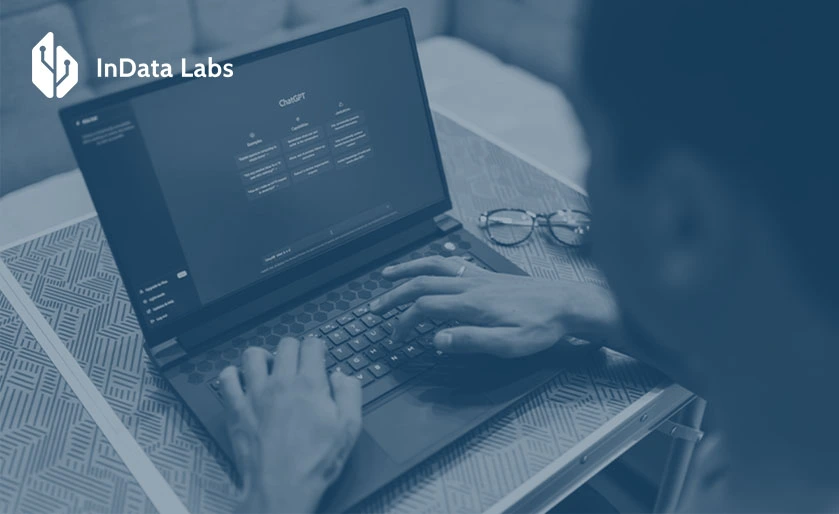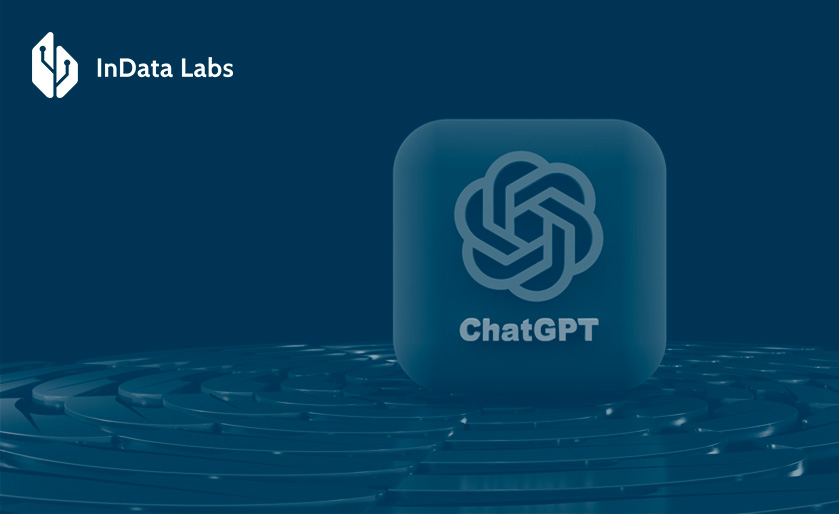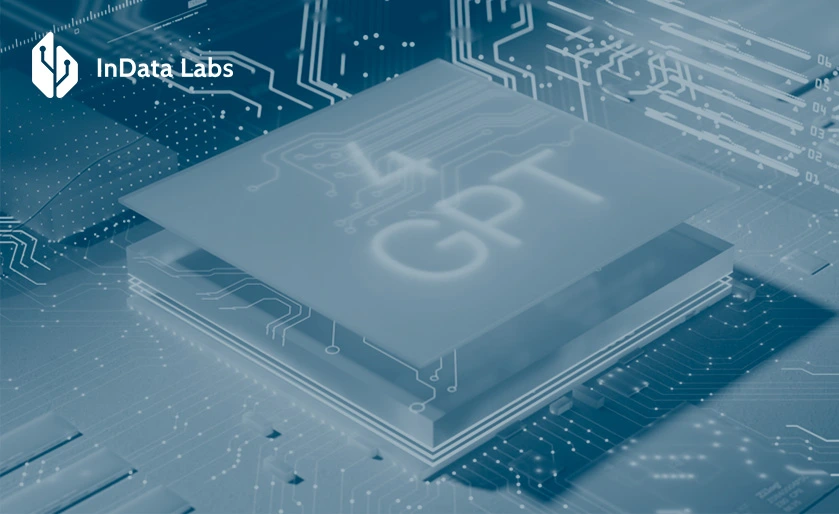From data analysis to customer experience, the application of ChatGPT in business has become quite a talk. The ChatGPT statistics suggest that the model made its way to roughly half of US companies, while 93% of those plan to expand their use of the ChatGPT in the upcoming months. New use cases are constantly being discovered, which drives the popularity and adoption of the tool among global businesses.
Let’s see how both small businesses and incumbents are using the model right now and how to use ChatGPT in your business.
What is ChatGPT?
ChatGPT is a type of generative AI that employs natural language processing and machine learning to have conversations in a human-like manner. Not only can this foundation model respond to questions, but it also can be fine-tuned to complete specific business tasks. The main differentiator of the model is the high response accuracy, enabled by the ability to provide the tool with a detailed prompt.
How ChatGPT can be used in business: technology perspective
Over 90 percent of global executives agree that AI foundation models like ChatGPT will revolutionize where and how AI is used. But the impact of embedding it into a company’s operations depends on the adoption approach.
Consume
The majority of language models are designed to be easily accessible. Essentially, they do not require any additional groundwork to complete simple tasks for companies. That’s why global businesses can integrate ChatGPT directly through APIs and then add a few twists through prompt engineering. However, this adoption approach doesn’t let users use the tool to its full potential.
Customize
To make ChatGPT widely usable across the company, businesses need to fine-tune the model with their own data. Fine-tuning allows the tool to vacuum up the entire history, context, and intent of a business and use this data to produce accurate responses. However, this adoption approach presupposes custom large language model development and a larger investment.
Top real-world ChatGPT applications in business
According to Mckinsey, generative AI can add the equivalent of up to $4.4 trillion annually across the 63 business use cases. Let’s see how global companies are catching up to an accelerating opportunity – often with phenomenal results.
Octopus Energy
Industry: Renewable energy
Application: Customer service
Today, 62% of consumers favor customer service bots over human agents to answer their requests. However, traditional, rule-based chatbots are prone to mistakes and misleading answers. They cannot handle ambiguous customer queries that don’t fit into their predefined rules.

So no wonder, that chatbots have become one of the most popular business uses of ChatGPT and Octopus Energy bears out this tendency. The company has built GPT-based chatbots into its customer service channels to handle customer inquiries. As of today, the bot has taken over 44% of all inquiries and substitutes for the work of 250 people.
Bionic Health
Industry: Healthcare
Application: Preventative care
The global market of generative AI in healthcare will be growing at a blistering pace of a CAGR of 35.14% up to 2032. As the industry implements complex diagnosis and treatment methods, generative AI can provide more enablement to the patient and break down complex information into easily digestible prose.
Bionic Health, an AI health clinic startup, has recently nabbed $3 million in seed funding to pursue a novel application of ChatGPT for business. The start-up is on a mission to leverage GPT-4 and other ML models to design better preventative care.
According to the company, the language model will help patients make sense of diagnostics results. The ML engine will analyze the results, while a language model will deliver personalized insights to the user.
Beamery
Industry: Human capital management
Application: Recruiting
As global recruiting has become online-based, recruiters are receiving more applications than ever before. A growing number of applicants has made the recruitment process more time-consuming and resource-intensive. To reduce hiring cycles and lift the workload off the HR team, companies resort to AI to automate the process. This made recruiting one of the trending GPT business use cases.
Beamery, a global human capital management company, has capitalized on the potential of this application of ChatGPT in business. The company has its own AI language model platform called TalentGPT. TalentGPT tailors job descriptions to the skills that organizations lack, personalized emails to the candidates, and provides career recommendations to employees.
Salesforce
Industry: Customer relationship management
Application: Writing assistance
Customer relationship management is no easy feat as customer preferences and information are always changing. Artificial intelligence helps businesses automate routine processes within their CRM systems and improve decision-making through advanced data analytics. Salesforce, a well-known CRM platform provider, has gone an extra step with AI. The platform debuted its GPT-based tool, EinsteinGPT, which acts as a co-pilot for salespeople.
Not only can it string words together in a meaningful sequence, but it can also deliver granular content across every sales, service, and marketing interaction. By pairing EinsteinGPT with other language models, companies can also apply NLP prompts to CRM data and trigger game-changing, time-saving automation.
Zurich Insurance
Industry: Insurance
Application: Claim processing
Underwriting and claims are the two backbones of risk management for insurers. However, speed of processing has always been a challenge for insurance companies, both in terms of underwriting quotes for new customers and in paying claims faster. According to Accenture, process inefficiencies in underwriting can cost the industry $160 billion in the next 5 years.
Zurich Insurance went off the beaten track to solve the challenge of underwriting. The global insurer is testing the waters of GPT to make claims data extraction easier. To perfect this ChatGPT use in business, the company is fine-tuning the tool with claims data collected over the course of 6 years.
Massive Bio Inc.
Industry: Healthcare
Application: Clinical trials
Clinical trial recruitment has long been a challenge in the drug development industry. According to the statistics, 55% of researchers struggle to secure the right number of patients at the right time. And as clinical trials are becoming more complex, it’s even more difficult to take the hassle out of recruitment.
AI technologies buffer the recruitment strain by automating patient data analysis. Massive Bio, a provider of personalized oncology solutions, has introduced a GPT-based analysis tool into the clinical trial workflow. The algorithms facilitate patient enrollment by interviewing a potential candidate according to the specific inclusion and exclusion criteria.
Klarna
Industry: Retail
Application: Product discovery and recommendations
Product recommendations have become an essential tool in the world of E-commerce. By activating AI algorithms and data analysis, retailers can now recommend products to their customers based on their browsing and purchasing history. This personalized approach increases overall sales, scales up-selling and cross-selling efforts, and enhances customer experience.
Klarna, a payments and shopping service, has rolled out a personalized shopping experience based on the GPT engine. The new feature suggests relevant products to the users, sends product links and compares items based on specific characteristics. This ChatGPT use in business is expected to create value for Klarna’s network of 500,000 retail partners.
Koo
Industry: Media
Application: Content production
Content production at scale is the central ChatGPT application in business. Thanks to high-quality responses and the ability to self-correct, the potential of ChatGPT in NLP tasks has drawn a great deal of attention. The capacity to scale content is especially useful for social media content creators who have to produce a large number of posts consistently to retain an audience.
Koo, a close rival to Twitter, has made the GPT model a part of the user experience. This advancement is designed to help users create posts easier and faster, without compromising the message or quality of the content. The company hopes that the introduction of this ChatGPT business use will help the platform boost the figure of active users.
Morgan Stanley
Industry: Finance and banking
Application: ChatGPT for business analysis
Among other applications, language models lend themselves well to performing thorough business analysis. They can extract valuable insights from vast amounts of unstructured data, such as customer reviews or company data, and hit levels not seen for small and large businesses.
Morgan Stanley, a multinational investment bank, was among the first to recognize the power of ChatGPT in business analysis. The financial services company fine-tuned the GPT model and tailored it according to internal regulations to contemplate financial data. The tool assists 16,000 financial advisors in analyzing the bank’s archives of research and data. The responses generated by the model will then help financial advisors refine the offering, thus improving customer service.
Duolingo
Industry: Education
Application: Study aid
Education is not exactly one of the GPT business use cases to come to your mind as you first think of it. However, language models can create personalized tutoring experiences, comb through student performance data, and provide tailored feedback. Moreover, GPT-like models can offer tailored guidance to students and bridge the gaps.
Duolingo is one of the companies that believe in the winning duo of language models and education. In the quest for more quality learning, the world-known app introduced the GPT-powered model into its premium tier. Duolingo’s subscribers can now ask the app to learn more about their responses in the lesson and practice real-world conversation skills.
Doximity
Industry: Healthcare
Application: Administrative tasks
The administrative creep in healthcare has long been creating inefficiencies in the industry and taking a toll on the quality of care. Around $1 trillion out of the total $4 trillion of the healthcare budget in the US is spent on administrative functions. Appointment scheduling, facility finances, billing, and other activities eat into the time of healthcare professionals and leave less time for patients.
Recently, Doximity, a digital platform for medical professionals, released a beta version of its DocsGPT tool. The latter helps medical professionals streamline a large chunk of administrative tasks, including faxing preauthorization and appeal letters to insurers. The company collaborated with doctors to fine-tune the product.
Wondercise
Industry: Wellness
Application: Personalized recommendations
Personalized recommendations are old news in the online fitness industry. They boost user satisfaction and add a personal touch to the user’s digital fitness journey. But most of the time, tailored advice is served in a one-way manner based on the input fitness data.
Wondercise, an advanced smart fitness system, is planning to redefine smart assistance within a fitness app. The platform has piloted a GPT-based virtual assistant that will provide personalized aid to fitness enthusiasts. Unlike traditional personalization, the system will continuously learn and evolve to provide more tailored recommendations for each unique individual.
Shortcomings and ChatGPT risks to businesses
It seems like a lion’s share of companies stand to benefit from the promise of ChatGPT in business. But the adoption of generative AI imposes new and additional burdens on business owners, calling for a thought-out strategy and tech enablements. Let’s see what challenges might stand in the way of your gen AI projects if you decide to join the lighthouse adopters of GPT.
Model and output bias
ChatGPT for businesses is a robust tool, capable of automating a bunch of tasks within your company. However, if the training data is incomplete or inaccurate, the tool will produce incorrect predictions. To avoid this mishap, your custom GPT-based model should be trained on the right, un-siloed data and according to the right algorithm. On the same line, your model might need extra context that might be provided by third-party data.
Inconsistent answers
If not corroborated against the actual enterprise data, algorithms can produce biased results, impacting the outputs generated by the models. This is likely to happen when a company consumes the model as is, without fine-tuning it with its proprietary or distinctive datasets. To overcome this challenge, businesses should customize the model before introducing it into the workflows.

Source: Unsplash
Security concerns
Another problem with the use of ChatGPT in business is that it may expose your sensitive data to other third parties. Unless deployed locally, the language model shares your data with the provider’s servers, putting it at risk of unauthorized access.
To keep your enterprise data under wraps, your model should either be deployed locally or on a private cloud. This way, you retain full control over data processing and make sure a model abides by your internal policies and regulations.
Lack of IT resources
Lastly, the ChatGPT impact on business hinges on how well it fits into your IT architecture. Although powerful, this tool can generate value only if orchestrated together with the rest of the pieces.
High-quality training data is the backbone of any custom language model built on the back of GPT. You need to collect data, preprocess it and make sure it’s representative and diverse. Data cleaning and augmentation also often come into the picture, especially if you’ve never paid due diligence to manage it.
Besides, you need to perform a proper set-up (whether in the cloud or locally) and assign a team of experts to train the model and write the algorithms. To tackle this problem, you can either invest in the in-house IT unit or resort to generative artificial intelligence providers.
Use of ChatGPT in business: it is just taking off
The introduction of a large language model into the business landscape is poised to transform how companies handle manual, time-consuming tasks. From administrative workflows to content generation and customer service, the uses of ChatGPT in business abound in value, cost savings, and added revenue.

Innovate securely with large language models based on GPT
In case you’re wondering how to use ChatGPT in business, InData Labs can get you all set up to strategize, design, customize, and develop a tailored generative AI solution for your business use case. Contact us and get a head start on your project.



